Building Databases On GCP: Cloud SQL VS Cloud Spanner – Comparing Options
Last Updated :
02 Apr, 2024
In today’s world when everything is available over the internet and more people are getting connected to the internet the amount of information or data is also increasing exponentially. Every application or service on the internet operates on data and is connected to some type of databases. Databases work as a backbone for application as data source and data sink. Google Cloud Platform being a prominent cloud provider, offers database services like Cloud SQL and Cloud Spanner. Both are efficient relational database services provided by GCP. Though they provide similar services but are not the same. In this article we will be exploring about the differences between these database services by GCP which are Cloud SQL and Cloud Spanner.
What is Cloud SQL?
Google Cloud Platform’s Cloud SQL is a fully managed relational database service available on Cloud. Cloud SQL has support for database engines like MySQL, PostgreSQL, and SQL Server for building databases. Using Cloud SQL developers need not to worry about the infrastructure and other manageable services as Google Cloud handles all those things on it’s own. Cloud SQL also automates tasks like replication, backups, updates and other administrative tasks.
Some of the key features of Cloud SQL include,
- Scalability: Cloud SQL supports vertical scaling which helps users to scale up the database incase they want to accommodate more data in the databases.
- High availability: Cloud SQL provides high availability as it automatically replicated data across multiple zones in a region. This helps in reducing downtime significantly.
- Better Security: Google Cloud Platform is a secure cloud provider and provides security to it’s services including Cloud SQL. Encryption is provided for cloud SQL at rest and in transactions. Other Security measures are provided by IAM configurations and Network isolation to safeguard data.
- Fully managed services: One of the key feature of Cloud SQL is fully managed service as it doesn’t require handling database maintenance,, backups, updates and other services by user.
- Compatibility with existing databases: Cloud SQL supports multiple popular relational databases i.e. MySQL, PostgreSQL, and SQL server. This enables migration from these databases to Cloud SQL seamless.
What is Cloud Spanner?
Cloud Spanner is a flagship database service provided by Google Cloud Platform (GCP). Cloud Spanner provides globally distributed relational database services. Cloud Spanner has the efficiently of Relational Database and flexibility of NoSQL databases. Along with vertical scaling like Cloud SQL, Cloud Spanner can be scaled horizontally. Cloud Spanner is designed to scale horizontally across multiple regions without compromising in consistency. Overall, Cloud Spanner is the best option available for globally distributed applications with high throughput and low latency.
Following are the features of Cloud Spanner,
- Consistency: Cloud Spanner provides strong consistency to ensure that data remains consistent across distributed nodes even in there exist network partitions.
- Scalability: Cloud Spanner is highly scalable. It has flexibility like NoSQL databases. Cloud Spanner databases can be scaled vertically and horizontally.
- Support for SQL: Cloud Spanner supports standard SQL queries and relational database schemas. This helps developers to use Cloud Spanner with relational database systems.
- Global Distribution: Cloud Spanner enables data replication across multiple region and zones. This helps in providing high availability, high scalability, data recovery, etc.
Difference between Cloud SQL and Cloud Spanner
Though both the services Cloud SQL and Cloud Spanner are provided by GCP offers similar type of services but they are not the same. The difference between these services are discussed in the table below.
|
Aspect
|
Cloud SQL
|
Cloud Spanner
|
|
Definition
|
Cloud SQL is a fully managed relational database service provided by Google Cloud Platform (GCP).
|
Cloud Spanner is a globally distributed, highly scalable relational database service provided by Google Cloud Platform.
|
|
Managed Services
|
Cloud SQL manages services like backups, updates, patches automatically to help developers focus on logics only.
|
Cloud Spanner also offers fully managed services like Cloud SQL. It also supports automatic sharding and distributed transactions.
|
|
Scalability
|
Cloud SQL provides vertical scalability which allows users to resize the database as the need for space increases.
|
Cloud Spanner offers horizontal scaling across multiple regions and zones. This helps in global scalability.
|
|
Consistency
|
Cloud SQL provides consistency by using data replication automatically.
|
Cloud Spanner guarantees strong consistency. This includes data integrity across all the distributed nodes.
|
|
Global availability
|
Cloud SQL usually operates withing a single region, but can have a primary and secondary zone.
|
Cloud Spanner is designed for global deployments which supports multiple regions.
|
|
Automatically Sharding
|
Cloud SQL doesn’t supports automatic sharding across nodes.
|
Cloud Spanner automatically shards data to optimize database performance.
|
|
Data Replication
|
Cloud SQL replicates data within a single region for high availability but doesn’t supports global replication.
|
Cloud Spanner provides global data replication for high availability and low latency.
|
|
Latency
|
Cloud has high latency for global applications compared to Cloud Spanner due to being regional.
|
Cloud Spanner provides low latency for any type of applications including distributed applications.
|
|
Pricing
|
Cloud SQL has lower pricing compared to Cloud Spanner.
|
Cloud Spanner has a higher pricing for its advance features and global scalability.
|
|
Use Cases
|
Cloud SQL is suitable for traditional relational database workloads or regional applications.
|
Cloud Spanner is ideal for globally distributed applications with high scalability and low latency performance.
|
Set up Cloud SQL
Step 1: Open Google Cloud Console and Click on SQL option given in left sidebar.

Step 2: Click on Create instance and choose the database engine as per your requirements.

Step 3: Give your Cloud SQL instance a name which will serve as the instance ID. Give an appropriate password for the instance.
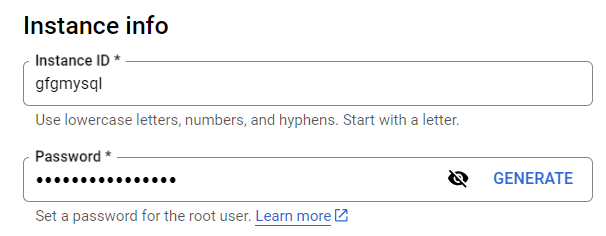
Step 4: Choose database version as the latest one available and then move forward and choose the Cloud SQL edition which are Enterprise Plus and Enterprise edition. Choose the one that suits your requirements and budget.

Step 5: Choose the suitable region and zones near to you. You can choose a single Region but multiple zones under the it.
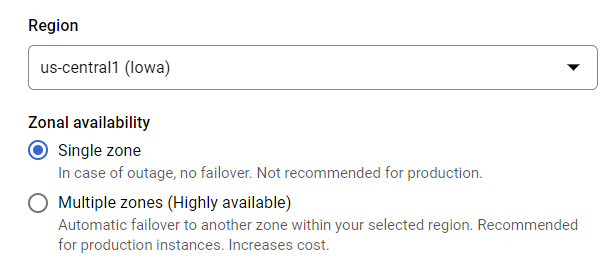
Step 6: Leave all other configurations as it is and look for the pricing and summary on the right hand side. Once reviewed click on Create.

Wait for few seconds for the Cloud SQL instance to be created and you will be able to see it.

Now you can use this Cloud SQL instance with other GCP services or use it to migrate from a on premise database.
Step Up Cloud Spanner
Step 1: On Google Cloud Console search for Cloud Spanner and you will be taken to the Cloud Spanner’s page. Select Create a Provisioned instance.
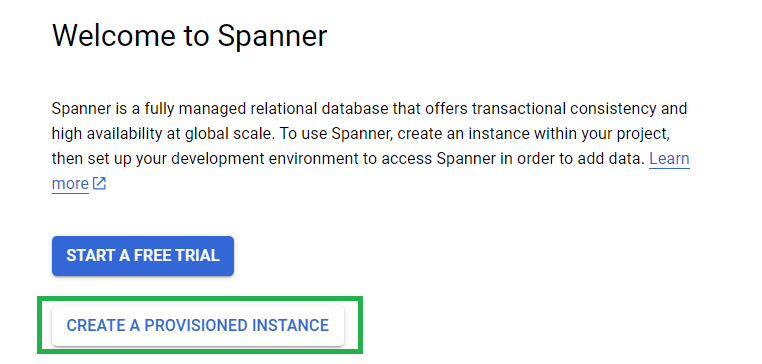
Step 2: The Cloud Spanner API will automatically get enabled. Give a suitable name for the Cloud Spanner and you can choose the same name for instance ID. instance ID will work as an unique identifier for the Cloud Spanner instance.
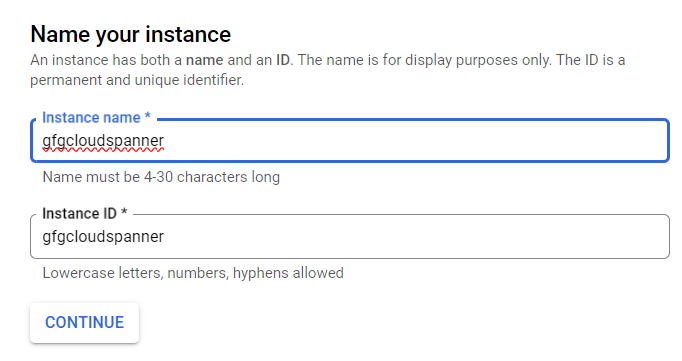
Step 3: Choose Regional configuration for the Cloud Spanner. Choose Multi regional for better performance and low latency. Choose the combination of regions for the Spanner and click on continue.
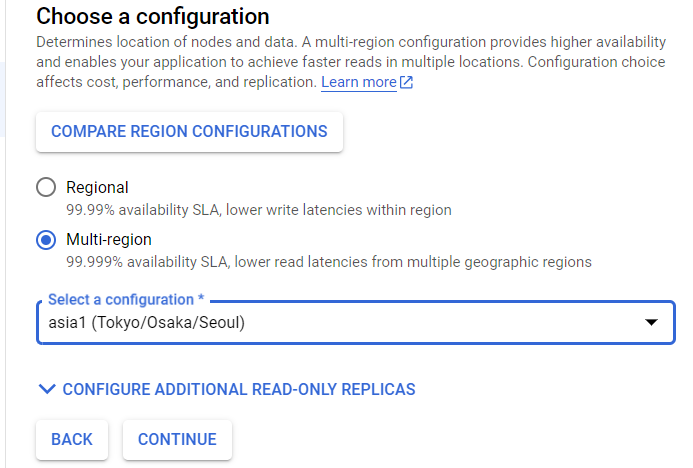
Step 4: Select compute capacity for the Cloud Spanner, Choose Node for large instances otherwise choose Processing Units. Define the number of units required of Node or Processing Units.

Step 5: On the right hand side, review the configurations given as summary and the pricing for the services. Once verified click on Create and wait for few moments for the Cloud Spanner to be created.

Once created, you will be able to see the Cloud Spanner instance in the instance list.

Conclusion
Both Cloud SQL and Cloud Spanner are useful services provided by Google Cloud Platform. Choose the one that suits your requirements based on size and type of the application or maybe the budget allocated for the project. Use the above comparisons and pricing summary provided for both the services to decide wisely.
FAQs on Building Databases on GCP: Cloud SQL vs. Cloud Spanner
1. Is Cloud SQL and Cloud Spanner are same?
No, Cloud SQL and Cloud Spanner are not same but both are database services provided by Google Cloud Platform.
2. What are the databases supported by Cloud SQL?
Cloud SQL supports major database engines which are MySQL, PostgreSQL and SQL Server.
3. Does Cloud Spanner supports SQL ?
Yes, Cloud Spanner supports SQL quarries for relational database operations.
4. When to use Cloud SQL and Cloud Spanner?
Cloud SQL is suitable for small size regional applications that operates of Relational Database and requires limited scalability. Whereas, Cloud Spanner is for large size multi regional applications which often requires high scalability and high throughput.
Share your thoughts in the comments
Please Login to comment...